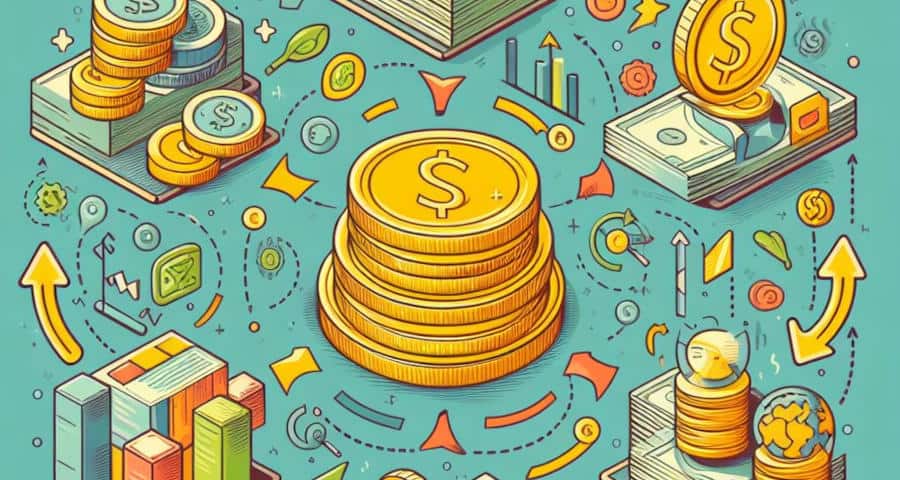Money is a part of our daily routine, woven into the fabric of our lives. We earn it, spend it, yet seldom pause to ponder its significance.
Whether it’s the cup of coffee you grab on your way to work or the monthly bills you settle, money is the silent force behind these transactions. It’s the means by which we exchange value, turning our efforts into tangible goods and services.
Economists offer a clear definition: money is any good widely accepted as the ultimate payment for goods and services.
The Functions of Money:
money serves three primary functions:
Medium of Exchange:
A medium of exchange is one of the key functions of money. It refers to the role of money as a widely accepted intermediary in transactions, allowing people to buy and sell goods and services without the need for a barter system.
In a barter system, individuals would have to exchange goods and services directly, which can be impractical and inefficient. For example, if someone wanted to trade a loaf of bread for a pair of shoes, they would need to find a person who not only had shoes but also needed a loaf of bread. This double coincidence of wants makes barter systems challenging.
Money as a medium of exchange solves this problem by providing a universally accepted medium that facilitates transactions. When individuals accept money for their goods or services, they can later use that money to purchase other goods and services from anyone else who recognizes it as a valid form of payment.
Unit of Account:
This function refers to the role of money in providing a standard measure for expressing the value of goods, services, assets, and debts in a consistent way. In other words, money serves as a common unit for pricing and comparing different items.
The benefit of money functioning as a unit of account is:
- Standardisation: Money allows for the standardisation of prices. For example, if you see a shirt priced at $20 and a book at $10, you can easily compare their values because they are expressed in the same monetary unit.
- Consistency: Using a single unit of account promotes consistency in economic transactions. Businesses, individuals, and governments can communicate and record values uniformly, making it easier to manage finances and make informed decisions.
- Economic Planning: Money as a unit of account facilitates economic planning and budgeting. Individuals can assess the relative value of different goods and services, helping them make choices based on their preferences and needs.
Store of Value:
This function is the ability to retain its worth over time and act as a reliable repository of wealth. In this capacity, money acts as a means for saving and safeguarding value, empowering individuals to postpone consumption until a later date.
Key aspects of money as a store of value include:
- Preservation of Purchasing Power: Money, as a store of value, should ideally maintain its purchasing power over time. This means that the amount of goods and services one can purchase with a certain amount of money remains relatively stable.
- Wealth Accumulation: Individuals can save money over time, accumulating wealth by storing it in a form that retains its value. This wealth can then be used for future consumption, investment, or other financial goals.
- Deferred Spending: Money’s store of value function allows people to delay spending until a later time. By saving money, individuals can choose when and how to use their accumulated resources based on their needs and preferences.
While money generally serves as a store of value, it’s important to note that factors such as inflation, economic conditions, and changes in the value of the currency can impact the purchasing power of money over extended periods. As a result, individuals may choose to invest in assets like stocks, bonds, or real estate to potentially preserve or increase their wealth over time.
The Unseen Impact of Money:
While money might seem mundane in our daily interactions, its influence is profound. It shapes our choices, influences our economic decisions, and plays a vital role in the stability of societies.
While the functions of money medium of exchange, unit of account, and store of value are evident in everyday transactions, the overall impact of a well-functioning monetary system extends beyond these immediate functions. Here are some aspects of the unseen impact of money:
- Economic Stability: A stable and widely accepted currency contributes to economic stability. It helps in mitigating uncertainties and allows businesses and individuals to plan and invest with greater confidence.
- Facilitation of Trade: Money plays a crucial role in facilitating trade on a global scale. It enables the exchange of goods and services across borders, contributing to economic growth and international cooperation.
- Resource Allocation: The use of money as a unit of account helps in efficient resource allocation. Prices, expressed in a common monetary unit, guide producers and consumers in making decisions about what to produce and consume.
- Investment and Capital Formation: A well-functioning monetary system encourages saving and investment. Money, as a store of value, allows individuals and businesses to accumulate capital for future projects and endeavours.
- Job Creation: The stability and predictability provided by money contribute to a favourable environment for businesses. This, in turn, supports job creation and employment opportunities.
- Innovation and Entrepreneurship: The availability of money and a stable monetary system foster innovation and entrepreneurship. Entrepreneurs can secure funding, and investors can allocate resources to promising ventures, driving economic development.
- Government Operations: Governments use money as a means to fund public services and infrastructure projects. It provides a mechanism for taxation, expenditure, and managing the overall economy through monetary policy.
- Social Dynamics: Money can influence social dynamics, shaping relationships and interactions. It plays a role in determining social status, access to resources, and overall societal well-being.
For a more comprehensive exploration of money’s role in our lives and its historical evolution, see our detailed article on What is Money?.
